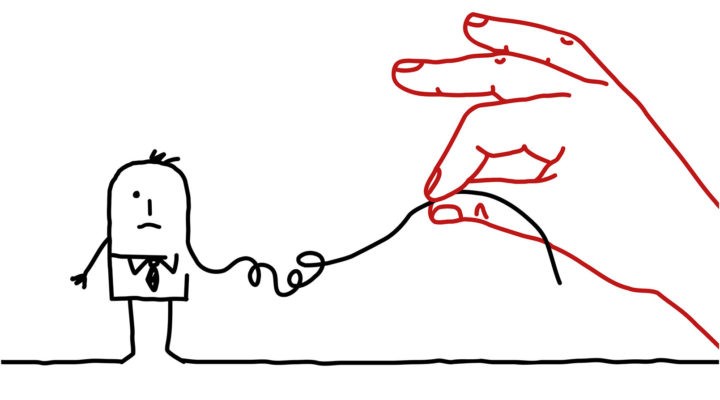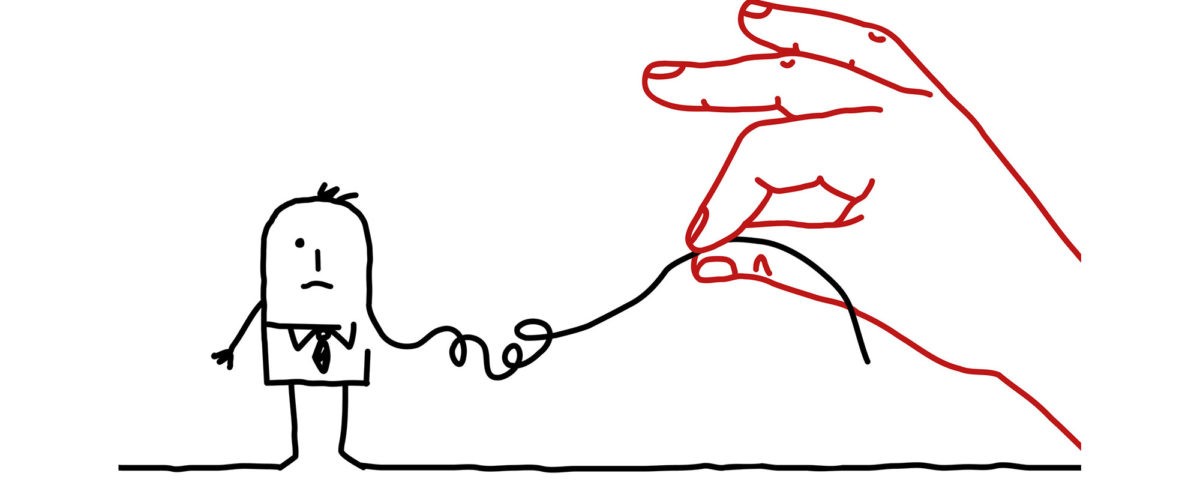What do a broken heart, a brain, a serpent and a thumbs-up emoji have in common? Any guesses? No? Good. Because these images are not the set up for a bad joke. They’re the artwork for a bad article.
In his article on The Gospel Coalition website, “4 Causes for Deconstruction,” Joshua Ryan Butler claims that deconstruction is the symptom of four possible spiritual conditions: church hurt, poor teaching, desire to sin, and street cred. Each of these diagnoses comes with its own cure: grief and lament, good teaching, confession and repentance, and crucifixion of image.

Amy Hayes
Unfamiliar with deconstruction? The name implies a certain tidiness and agency, as if a person just wakes up one day and decides to simply pick apart their faith in order to rearrange it all into an easier, more comfortable configuration. But don’t be fooled. No one vivisects their faith on a whim. Usually triggered by painful religious trauma, deconstruction engulfs a person, forcing them to confront all the ways in which the current form of their faith has failed or hurt them.
For some, this vivisection results in a reimagining of their faith. For others, it soundly destroys it. For everyone, it comes with grief and pain. Because, above all, deconstruction is a loss — of certainty, of community, of comfort. It’s a process that requires tenderness and trust.
Not that you’d know that reading Butler’s article.
A pastor at Redemption Church in Tempe, Ariz., Butler stops just short of advocating for outright contempt for those in deconstruction, an attitude especially evident in the following excerpts (emphasis mine):
“It’s a bummer if someone’s dealing with church hurt and you hand him a stack of apologetics books to read. Those same books will be useless if, beneath the surface, he really just wants to justify his sin.”
Deconstruction “allows you to save face, to look virtuous in your departure from God (‘He’s the problem, not me’), while distracting you from squarely facing your true motivations.”
“If Butler’s characterization is to be believed, then people who go the path of deconstruction are lazy, offended, arrogant rebels who just want permission to go their own (sinful) way.”
“I minister in a college town (go ASU Sun Devils) where students regularly deconstruct when they’ve started sleeping with their girlfriend or boyfriend. Convenient timing. Others deconstruct while harboring an addiction (drugs, alcohol, porn), to release their guilt.”
And there’s this one, which just sounds like something one of Job’s friends could have written:
“Deconstruction here is usually presented as an anguishing process of honest wrestling (‘I just don’t understand why God won’t show up and answer me’). It casts the questioner as the hero grappling authentically with a God too distant to trust or too difficult to believe.”
If Butler’s characterization is to be believed, then people who go the path of deconstruction are lazy, offended, arrogant rebels who just want permission to go their own (sinful) way. So, in a word, they’re the Prodigal Son. At least that’s what Butler and the evangelical church would have us believe.
Because if those deconstructing are the Prodigal Son, then that would make the church the Forgiving Father. It’s a pretty sweet setup if you wanted to, say, delegitimize criticism and avoid accountability.
Mapping deconstruction onto Luke 16 suggests that deconstruction is a function of bad character, of an overly-indulged flesh — or, as Butler put it, of our innate “desire for autonomy from God.”
Is it, though? What if deconstruction indicates a developing, not a deteriorating, faith?
This is precisely what James Fowler argued in his Stages of Faith, proposing that there are six stages to a person’s faith development. These range from a primal or undifferentiated faith all the way to a universalized or enlightened faith.
For our purposes, let’s just look at stages three and four.
Think of stage three faith as The Institution — that is to say, it corresponds to the capital “C” Church. Typically, believers in stage three find comfort in conformity with their community — the specific beliefs, practices, do’s and don’ts all contribute to a shared sense of security. Knowing and belonging abound here. Unless you disagree, that is.
Most of the faithful spend the majority, if not all, of their lives in stage three. And why wouldn’t they? Stage three faith paints the world, God and our lives in primary colors, collapsing all moral and spiritual nuance into smooth formulas with predictable answers. “Believe in the right things, behave in the right ways,” croon stage three leaders and communities, “and all will be right between you, God and the world.”
“But what happens when you do believe in the right things, you do behave in the right ways and things are still not right?”
But what happens when you do believe in the right things, you do behave in the right ways and things are still not right? When the formula fails, stage three offers only two options — abandon yourself or abandon God.
Wrestling with this tension forces people into stage four, The Wilderness. Here long-held assumptions about the mechanics of faith break down, stranding the formerly faithful in a theological wasteland. From stage three, such deconstruction looks dangerous. And, truth be told, it is.
Not everyone forced into The Wilderness makes it out. To be fair to pastors like Butler, this does partially explain their eagerness to control it. After all, they don’t want people to lose their faith. And by “their,” I mean The Institution’s.
Because people who do emerge from The Wilderness, having reconstructed their faith in new and lifegiving ways, are just as damned as those who remain in it. And that’s because their freedom confronts the real threat to faith: toxic theology.
If Butler and pastors like him truly care about people not losing their faith, why won’t they take seriously their congregants’ stories of anguish, confusion and anger?
Because sometimes looking in the mirror is too painful.
Because diagnosing is easier than deconstructing.
Because not only do they lack courage, they lack faith — that the real God is bigger and better than the one they sell their congregations.
Amy Hayes currently serves a Clemons Fellow with BNG. She is a master of divinity student at Mercer University’s McAfee School of Theology.
Related articles:
Jesus and deconstruction | Opinion by Terry Austin
The deconstruction of American evangelicalism | Opinion by David Gushee
Has conservative evangelicalism reached a dangerous moment of its own making? | Opinion by Susan Shaw


